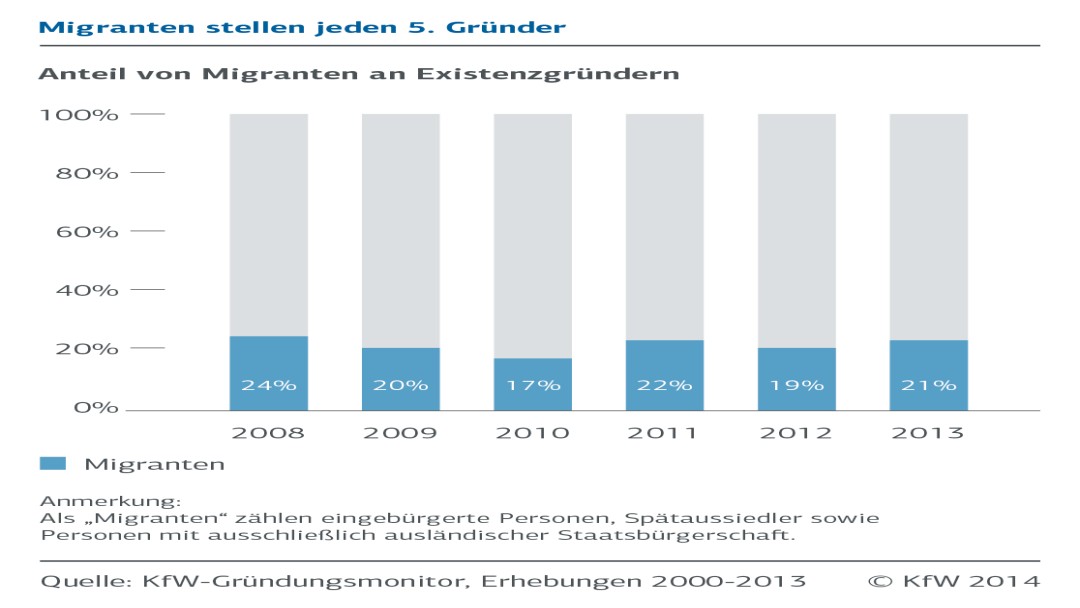Press Release from 2014-08-22 / Group
Migrants revive start-up activity in Germany
- Almost 60% start up as the result of a business idea
- Migrants more frequently create businesses with employees
- Financing difficulties have improved
- Every fourth migrant sets up a retail business: knowledge of domestic markets frequently leads to business ideas
Out of the around 868,000 founders who set up their own businesses in 2013, 21% are migrants, i.e. they are either of foreign nationality or have acquired German citizenship. Thus, as in previous years, the percentage of migrants setting up their own businesses is slightly higher than their share in the population (18%). They set up more frequently with employees: On average during 2008–2013, 42% of migrants who set up their own businesses had employees from the very outset, whereas this was the case for just 29% of all business start-ups. “New businesses set up by migrants are extremely important for the overall number of new businesses in Germany. The majority of migrants create their business on the basis of a specific business idea that more often involves bringing an innovation onto the market,” says Dr Jörg Zeuner, Chief Economist at KfW, about the results of a study using data from the KfW start-up monitor. “More than one in four migrants sets up a new business in the retail sector. It is assumed that many have good knowledge of their domestic markets and therefore exploit favourable business opportunities in the retail sector.”
Among the migrants, those who were formerly (before acquiring German citizenship) or are currently of Turkish nationality represent the greatest percentage of entrepreneurs (average 2008–2013: 21%). There is also a relatively high percentage of business founders of former or current Russian (10%), Polish (7%) or Italian (5%) nationality, which corresponds roughly with their percentage of the population.
There has been an above-average decline from 34% to 25% in the number of migrants who encounter difficulties in financing their start-ups. Nevertheless, a greater number of migrants encounter financing problems compared with the average number of all business founders (2013: 17%).
The number of start-up projects that close down is relatively high overall: after 12 months 15% of the businesses no longer exist, and this figure increases to 30% after 36 months. The number of migrants who close their businesses down is somewhat higher (21% after 12 months, 39% after 36 months). “In terms of the risk of a business closing down, nationality is not the decisive factor. It is rather a question of many migrants being young and out of work when they set up retail businesses – and these are all factors that are associated with a lower level of resilience for start-up projects. Migrants also close down their businesses when attractive job opportunities emerge,” explains Dr Zeuner.
Note: The findings are based on a special analysis of the 2013 KfW start-up monitor, a representative survey on the number of start-up businesses in Germany.
Further findings on the number of new businesses set up by migrants can be found in the latest study at www.kfw.de/fokus. Press materials (including graphics and photos) on this subject are available for download at www.kfw.de/gruendungen-durch-migranten



Share page
To share the content of this page with your network, click on one of the icons below.
Note on data protection: When you share content, your personal data is transferred to the selected network.
Data protection
Alternatively, you can also copy the short link: https://www.kfw.de/s/enkBbm2w.2ZA
Copy link Link copied